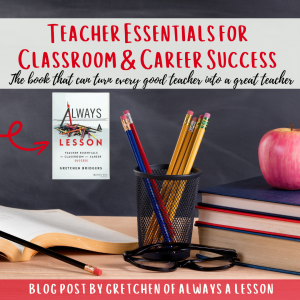There are four essential aspects of instruction that have the greatest impact on student learning- lesson design, classroom management, student engagement as well as student ownership and accountability. This post explores the teacher essentials for classroom and career success.
The Discovery
Throughout my years as a classroom teacher, I helped numerous students become successful learners through rigorous content delivery, preventative management of the environment via procedures, interesting and aligned collaborative activities and appointing student leaders to run various aspects of the classroom.
As a teacher coach, I helped teachers develop systems to find success in the same way I had. However, some teachers struggled. I realized the four essential aspects of instruction were correct, but the results (student learning outcomes) varied depending on the order in which I helped teachers work on their instructional planning and delivery.
The more I paid attention to what instructional aspects we worked on and what sequence had the greatest impact, the "Teacher Success Pathway" was developed. When teachers improve their instruction in the specific sequence mentioned in this pathway, student learning and teacher proficiency soar.
The Details
In the section below, each of the four aspects of instruction will be discussed in the suggested sequence that allows for greatest results. To improve your instructional impact, self-reflect on which aspect is the root of your obstacles. Making these adjustments will allow teachers to experience classroom and career success.
For example, you might want to incorporate more engaging learning activities but students cannot follow directions or meet behavior expectations. Therefore, you have to move to the layer below (classroom management) to attack the root of the issue. Let's take a look at the teacher essentials below.
Lesson Design
Do not confuse design for planning. Regardless of what planning document a teacher uses, it should include components that allow for a thorough plan of how the lesson will flow. This requires teachers to pay attention to the details. It is not enough to just write down the standard, objective, assessment and activity for a lesson. Teachers need to script higher level questions, pace each portion of the lesson, pre-assign student pairings, pinpoint ideal answers to key points in the presented material, decide how students will transition around the room and gather necessary materials, etc. A lot of preparation goes into a lesson start to finish. A lot of obstacles teachers face when executing their lesson comes from the lack of planning of the lesson that occurred. Prevention of misbehaviors, clarity in assignment directions, differentiated support options available as needed and more allow for the other aspects of instruction to be successful, but they are planned for in the design phase. This is the foundation for which all other aspects rely.
Classroom Management
Classroom management is not the same as behavior management. We cannot control other people. When we try, it results in frustration and feelings of safety diminish. Therefore, we focus on what we can control- the classroom environment. The procedures and routines we set up in our classroom allow students to be successful learners. This requires thorough planning throughout the lesson so that during the delivery of the content teachers can be present to support the unique needs of students. If teachers are spending the majority of their lesson execution managing behaviors then is being reactive instead of proactive. Go back to the lesson design phase and put procedures in place to provide boundaries and clarity to the expectations for learning activities.
Student Engagement
This is usually the area of focus for most teachers. They want to do more fun activities with students, but have a hard time getting children to be motivated enough to want to participate. Speaking of, participation is not the same as engagement. Participation is low level interaction (thumbs up, yes/no questions, head nods, etc.). Engagement is high level interaction where students collaborate with peers, ask and answer questions with the teacher, and dig deep into the content of the text with intention. The goal for improving this aspect of instruction is not on the actual engagement activity, rather the design of the engagement opportunity. Again, all of this planning is done in the design phase. Is the engagement opportunity aligned to the standard and objective? If not, there is no reason to place it in the lesson. If it is aligned, are expectations planned out to the detail, including procedures? A breakdown in engagement rarely has to do with the students and more to do with the design of the lesson on the teacher's part. Focus more on how students will engage, rather than on what.
Student Ownership and Accountability
The highest level of instructional success is a self-run classroom. Students are in charge of administrative tasks around the classroom, like greeting guests at the door, answering the class phone, working the overhead projector, manipulating the timer for activities, reading school announcements, taking attendance, explaining activity directions, demonstrating exemplars, and so on. This frees the teacher up to focus solely on teaching students and not on running the classroom. Students become more invested in learning because they feel like they have a part to play in the classroom. Their opinions are taken into account, they have access to leadership opportunities and feel valued for their skillsets. Although most teachers desire this type of learning environment in their own classrooms, it is not possible if the other three aspects are not strongly in place first.

